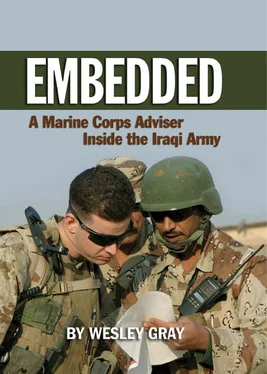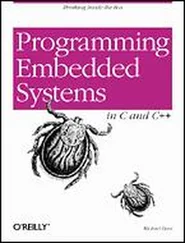I looked at Martin. “And this is a good thing?” I asked. He laughed and said, “Yes, that is the key point to understand here. Let me give you an example. Currently the Marines try to get information from the locals about IEDs. As you know, placing an IED takes a long time to dig, set the wiring, and so forth. Thus if an IED is in the middle of a neighborhood, everyone knows about it. Yet when Marines go in to ask, ‘Who did it?’ after having their Humvee blown in half, they get blank stares.”
Martin paused before continuing. “You want to know how this situation would be solved using proven Iraqi methods? First, the Iraqi army would tell the people that unless the people who did the terrorist act were turned in during the next twenty-four hours, a single residence would be demolished. If after that first day nobody had spoken, the army would demolish an entire street of homes. Within hours of this engagement, I can promise you that you will have names, addresses, and the family members of the insurgents. The Iraqi army will then take this information and execute the insurgents. This is how Saddam did things, and this is how things work in Iraq. Period.”
I sat speechless for a moment and told him I would have to think about my response and get back to him. Martin smiled. “Think long and hard,” he said, “and when you figure it out, become the president of Iraq.”
If Martin is correct, it will be difficult to accomplish our strategic mission in Iraq of creating a peaceful, stable, and democratic-based government that serves the people, especially if we let them decide how to do things. Paradoxically, if we let Iraqis do things the way they want to do them, it means Iraq will end up as a tyrannical military dictatorship again. This would bring us full circle. And if we confine the Iraqis to using our methods, they will end up in the same situation our troops find themselves in: asking the locals where the IED makers are and getting blank stares.
As Martin and I chatted, Moody woke up. Moody inquired, “What are we talking about today?” I smirked and said, “The history of Iraq.” Moody laughed. “You mean the history of America trying to take our oil and claim they are helping us become democratic?” I said, “Yep, exactly. You think I came to this place for my own health?” Moody replied, “You Americans are way too naïve. I truly believe your president might be stupid enough to think he can get Iraqis to trust him.” Confused, I asked Moody what he meant, and he explained altruism to me. “Jamal, to Iraqis, the concept that somebody would actually want to help another person without some material benefit is ridiculous. Attempts at altruism are a strong signal for one thing—the person you’re dealing with is an Ali Babba!”
Moody’s description helped clarify why Iraqis have such a deep suspicion of America’s proclaimed desires to help the Iraqi people. He outlined it best when he said, “Americans may think Iraqis are towel-head idiots who are still living in the ice age, but we are not naïve; we know we sit on more oil than all of Saudi Arabia.” He continued. “How can any Iraqi believe Americans have come to our country just so they can improve the lives of Iraqis? Your country has spent billions of dollars and countless lives fighting here—all of that for nothing? You must think we are crazy. Plus, why hasn’t America gone to the countries in Africa who are ten times as poor and actually need your help? Do you see what I am saying?”
Moody and his fellow terps agreed. I tried to convince them that American policy in Iraq was genuine. The terps simply laughed and said, “Jamal, you are crazy.” Maybe they were right.
Being the only one to learn Arabic on the team became a curse. The boss designated me “leader of all Iraqi babysitting operations.” Not a great job, but somebody had to do it, and I was the most qualified. I figured it would give me more time to learn Iraqi Arabic and Iraqi culture.
When I pulled my first duty as an Iraqi babysitter, I was fortunate enough to be babysitting the leadership of the newly restarted Haditha Police Department—Colonel Farooq and his three captains, Arkon, Yunis, and Harat. Colonel Farooq was in and out, speaking with sheiks in Haditha, but Arkon, Yunis, and Harat were with me all day.
After ten minutes of small talk, Arkon realized there was no need to feed me the standard lines he gives Americans. He loosened up. “Jamal, let me show you what the insurgents have done to my family.” He pulled out his cell phone and showed me the pictures and video eulogies of fifteen close family members who have been killed in the past few months by insurgents in the Triad. He growled, “I want to kill every one of these bastards!” Yunis and Harat nodded in agreement. Yunis spoke next. “We are in this business not because we want to help the Americans,” he said, “but because we want to get revenge.”
I thought to myself, I have a hard time when one of my family members dies. I can’t imagine how I would feel if fifteen of my close family members died within a few months. Imagine if three of your brothers were shot in the head, your mother was shot in the stomach, two sisters were stabbed to death, five cousins were killed, an uncle was decapitated, and three aunts were murdered. Hell, I wanted to get revenge for these guys and I did not even know them.
In true Iraqi fashion our conversation went from hysterically emotional to completely normal within one minute. I asked my new friends, “Can I get you guys anything? A drink? Some food?” Yunis responded with a smile then said, “Hey Jamal, you guys have sexy magazines, right?” I paused for a moment, trying to remember if nudie mags were taboo or going to offend Islam and cause Iraqis to commit jihad on me. Finally, my common sense hit me: every man loves to look at beautiful naked women.
I rushed to get my guests some chick magazines to ease their minds. I returned, and when I barged into the room, Harat was on his prayer rug facing Mecca. He mumbled under his breath, “Allah Akbhar, Allah Akbhar. La illah il Allah.” (God is great, God is great. There is no God but Allah.) I gave him a puzzled look and muttered, “This is really weird.” I stood speechless with a Penthouse magazine, a Buttman magazine, and a Club magazine in my hand as the Iraqis conducted their prayers. Allah is definitely sending me to hell for this one.
Yunis blurted, “Jamal, throw me those magazines, man. What are you waiting for?” After finishing his prayer session, Harat snapped to his feet and ripped the magazines from Yunis. “Hey, share those,” he said. I chuckled to myself. This was definitely not in the cultural classes I got in the States.
Not surprisingly, Iraqi men are addicted to hot women. Yunis flipped through the various photographs, saying, “Man, I would drop my wife this instant and move to America if I could get one of these women.” I responded in jest, “Dude, you know not all women are like that in America, right? Only in South Florida do they all come like that.” Somehow my Arabic did not convey my intended humor; Yunis, Atron, and Harat all want to move to Florida now.
Everyday with the jundi was an adventure. Lieutenant Le Gette, the adviser team’s artillery officer, and I walked to the motor transportation area of the camp to inquire about the Iraqis’ pressure washer that was rumored to be destroyed. We approached the motor transport area, stumbling over random Humvee parts, tools, lubricants, and inoperable tactical vehicles along the way. We approached Amir and Hussein, who were washing one of their Humvees with the pressure washer, and I explained the situation. “Have you guys had any problems with your pressure washer? We were told it was busted.” Both men gave us a blank stare. What a stupid question; we were sitting there watching them use the pressure washer, which was obviously functional. The Iraqis laughed. “Jamal, as you can see, the pressure washer is fine. Who told you it was broken?”
Читать дальше












